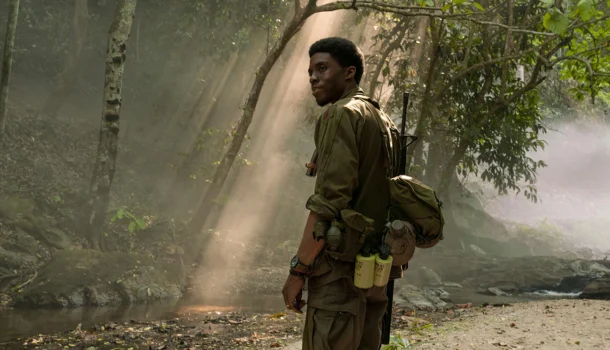Instead of invoking the past as a static archive, Spike Lee summons memories as open wounds — bleeding in rhythm with the exposed veins of the present. “Da 5 Bloods” doesn’t merely respond to the protests that shook the United States after George Floyd’s murder — it merges with them. The film isn’t an echo but part of the reverberation. At a moment when the streets demanded justice, Lee delivered a narrative that rejects the comfort of silence and defies the anesthesia of convention. It is a work positioned between historical trenches and contemporary scars, embracing the risk of being uncomfortable, imperfect, and utterly urgent.
The plot centers on four African American veterans who return to Vietnam, officially to recover the remains of their former squad leader, Norm. But the real driver of their journey is a stash of gold bars they buried decades earlier. Norm, played by Chadwick Boseman, is not just a comrade-in-arms. He is symbol and idea, flesh and myth — a mentor of Black consciousness in the midst of a war that didn’t even recognize them as full citizens. The film alternates with flashbacks in which Norm becomes, in the others’ eyes, a kind of insurgent prophet — not merely the perfect soldier, but a beacon of identity in hostile terrain.
Lee adopts a language that transcends linearity. What might have been a straightforward rescue story turns into a political and aesthetic collage experiment. The sequences mix archival footage, documentary-style shots, journalistic images, and performances steeped in fury and sarcasm. The critique of Black conscription into wars waged by a system that excludes them is delivered unfiltered. And the figure of Donald Trump looms like the specter of a cynical present — reflected in red caps and patriotic bluster that tries to smother the discomfort of contradiction.
Lee’s caustic humor flashes between gunfire and memory — sometimes functioning as catharsis, other times as deliberate provocation. Portraying Black men as war heroes isn’t just a historical correction; it’s a political gesture of symbolic affirmation. By granting them centrality, fallibility, and heroism, Lee confronts decades of erasure and marginalization in the collective imagination of war films.
However, there’s a fissure that threatens the film’s ethical structure. In portraying Vietnamese characters with caricatured traits, the director risks falling into the very logic of dehumanization he so fervently critiques. His gaze toward the “other” — in this case, the Vietnamese — is less generous, less nuanced, more functional to the protagonists’ narrative. It’s a contradiction that weakens part of the film’s moral strength and raises a legitimate debate about the limits of committed representation.
The aesthetic ambition of “Da 5 Bloods” is undeniable. The cinematography alternates between different formats, evoking at times the subjective immersion of combat, at others the distorted recollection of the past. The soundtrack, infused with soul and protest, connects each scene to a collective memory — more than illustrating, it summons. Lee constructs a film that is simultaneously a visual spectacle and a critical device, with stylistic overlays that turn excess into signature.
Among the performances, Delroy Lindo stands out, portraying Paul as a man ravaged by trauma, resentment, and paranoia. His performance is an exercise in emotional intensity that avoids caricature and dives into the abyss of the postwar psyche. Paul isn’t just a wounded veteran; he embodies a country struggling to live with the ghosts it created.
Throughout the narrative, the veterans’ bonds oscillate between camaraderie and conflict, reflecting the tension between what they once shared and who they’ve since become. There’s a search for redemption among them, but also a latent readiness for confrontation. The jungle-buried gold becomes a metaphor for promises made and broken — by both the nation and its own sons. What they truly seek isn’t the metal, but a way to reconcile with the time that disfigured them.
Spike Lee, with all his strengths and contradictions, delivers a film that insists on being more than entertainment. It confronts, exposes, provokes — even if at times it stumbles on its own momentum. “Da 5 Bloods” doesn’t ask permission to exist; it asserts itself as both outcry and scar. And even where it falters, it does so in pursuit of expanding the boundaries of what cinema can — and must — say about history, power, and Black lives.
Film: Da 5 Bloods
Director: Spike Lee
Year: 2020
Genres: Adventure/War/Drama
Rating: 9/10

